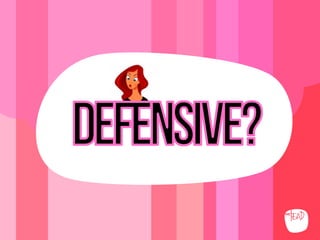
Defensiveness session e bs
- 2. Defensiveness affects a host of communication functions in organizations as well as individual understanding and perceptions, interpersonal effectiveness, work effectiveness, and organizational effectiveness. Beverly Byrum-Robinson and B.J. Hennig
- 3. Defensiveness—the act of protecting one’s self—often is viewed as a serious threat to communication and the subsequent success of organizations (Argyris, 1986; Baker, 1980; Giacalone, 1987; Peterson, 1977; Sussman, 1991)
- 4. Defensiveness affects people self-understanding, interpersonal effectiveness, and work effectiveness. Beverly Byrum-Robinson and B.J. Hennig
- 5. Self-Understanding Self-understanding is an important prerequisite to understanding and relating with others. Self-understanding is enhanced when one can identify the reasons one becomes defensive and the behaviors one exhibits when defensive.
- 6. Self-Understanding If someone tells a trainer in a training session that he or she does not live in the “real world,” so the skills he or she teaches won’t work, the trainer feels defensive. The reasons may be: ¤ The trainer’s credibility is being attacked, so he or she feels attacked. ¤ The trainer feels threatened (someone may think he or she is incompetent). ¤ The trainer feels angry because he or she thinks the skills being taught are very practical.
- 7. Self-Understanding Because of these feelings, the trainer switches to a self- protective mode, which results in defensive behaviors. These may include: ¤ Responding with a sarcastic comment. ¤ Overexplaining and justifying. ¤ Asserting his or her status as an expert. Unfortunately, behaviors such as these are unlikely to change the other person’s mind or help the trainer to feel better.
- 8. Self-Understanding Individuals need to know to what they respond to defensively and how they respond defensively. The focus needs to be on their own behaviors (which are under their control), not on the correctness or fairness of the other person’s behavior. In the example given, if the trainer were more aware of the triggering behaviors, he or she could handle the situation better and contribute to a productive outcome.
- 9. Interpersonal Effectiveness Interpersonal effectiveness is the ability to communicate effectively and to resolve problems with others. Controlling defensiveness enhances interpersonal effectiveness.
- 10. Interpersonal Effectiveness ¤ Continuing with the example, if the trainer responds with a sarcastic answer to the person who tells him or her that he or she doesn’t live in the “real world,” the trainee may not participate for the rest of the session. ¤ If the trainer simply reasserts his or her explanation and justification, the trainee may not feel listened to. ¤ If the trainer reasserts his or her status as an expert, the trainee will feel discounted. Thus, defensiveness results in deterioration of communication, which may lead to withdrawal, win/lose arguments, and/or standoffs. None of these situations allow relationships to be built or problems to be solved.
- 11. Work Effectiveness Because defensiveness prevents individuals from establishing trusting relationships, issues cannot be openly discussed; valuable opinions are not offered; and information may be withheld.
- 12. Work Effectiveness Problem solving then cannot address all necessary facts. Consequently, defensive behavior polarizes individuals and eliminates the possibility of arriving at creative and collaborative alternatives.
- 13. beliefs Activating event consequences
- 14. thoughts Activating event behaviors consequences feelings Physical reactions
- 15. feelings Activating Sensitivity behaviors event consequences to flaw Feeling attacked
- 16. Factor 4: Sensitivity to Flaw feelingsI screamed. ¤ ¤ I did not let the other person talk. ¤ I thought that I was different/did not belong. ¤ I cried. ¤ I thought my values/beliefs were a<acked/challenged. ¤ I felt uncomfortable with my Activating surroundings. Sensitivity behaviors ¤ I was emo=onal about the consequences topic. event to flaw Feeling attacked
- 17. feelings Factor 1: Feelings, Fear, Sadness ¤ I felt depressed. Activating ¤ I felt scared. Sensitivity ¤ I feltbehaviors alone. event consequences to flaw ¤ I felt uncertain. ¤ I felt ashamed. ¤ I felt hurt. ¤ I felt deflated. ¤ I felt flushed. ¤ My voice became “shaky.” ¤ I felt inadequate. ¤ I felt disappointed. Feeling attacked
- 18. feelings Factor 2: Feeling Attacked ¤ I had been wrongly attacked. Activating ¤ I felt a sense of injustice. Sensitivity behaviors ¤ I had a “personality conflict” with event consequences to flaw someone. ¤ I felt discounted. ¤ I realized there was a flaw in my viewpoint. Feeling attacked
- 19. feelings Activating Sensitivity behaviors event consequences to flaw Factor 3: Consequent Behaviors ¤ I wanted to hurt the person(s) that made me defensive. ¤ I wanted to damage something. ¤ I lectured the person. ¤ I wanted to get even. ¤ I became defensive toward person(s) similar to those involved in this situation. Feeling attacked
- 20. closing How do you think your inventory would have been different if you had thought of a personal, rather than an AIESEC, situation? What does that tell you?
- 21. closing What have you learned about sending messages that engender defensiveness? How might you change your own messages to decrease the likelihood of defensive reactions from others?
- 22. closing What is your hypothesis about how defensiveness is affecting your work relationships at your LC? How is affecting your life in general?
